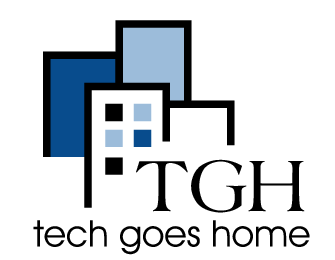Our Story
Tech Goes Home (TGH) is a 501(c)(3) nonprofit organization whose mission is to bridge the digital divide so that low-income, under-served populations in US cities have full access to technology and the Internet. Founded in 2000, TGH is a national award-winning initiative that has successfully provided under-served residents the opportunity, tools, education and access required for 21st century skills development. With the support and backing from the city of Boston, TGH focuses on serving the US’s most vulnerable populations, including children/youth, adults, seniors, and people with disabilities who are predominantly low-income, and/or from challenged neighborhoods.
Since 2000, Americans have witnessed the staggering adoption of technology in nearly every facet of their lives. Computers, the Internet, and mobile technology have fundamentally transformed how most Americans live, learn, earn, work, and play. Being connected to the Internet has become an essential extension to our families, our schools, and our places of employment. In the US today, there are more wireless phone subscriptions than there are people and nearly 75% of teens ages 12-17 own a cell phone. While one could easily assume that mobile and “home-based computer access” to the Internet has become universal, the stubborn fact remains that an estimated 100 million Americans have no access to a computer and Internet at home. Furthermore, as outlined in key municipal studies in NYC, Boston, Chicago and Los Angeles, many of America’s citizens living on the “wrong side” of the digital divide reside in US cities where 40% of those earning $34,000 or below don’t have Internet access. As highlighted in a March 1, 2012 piece by Gerry Smith (Without Internet, Urban Poor Fear Being Left Behind In Digital Age) “Being disconnected isn’t just a function of being poor. These days, it is also a reason some people stay poor. As the Internet has become an essential platform for job-hunting and furthering education, those without access are finding the basic tools for escaping poverty increasingly out of reach.”
Tech Goes Home is focused on tackling the entrenched barriers to technology adoption and Internet access in Boston and across the US. Our school, community, small business, and early childhood initiatives provide an impactful and cost-effective model to help families and participants gain access to the skills, hardware, and Internet access needed for 21st century success.
The current TGH model was developed in 2005 at the Frederick Middle School in Boston's Grove Hall neighborhood of Dorchester. Grove Hall is one of Boston’s most distressed areas. Recognizing the necessity of educating low-income urban youth using the most up-to-date and powerful technology, the Frederick team transformed the school into one of the nation’s first urban one-to-one laptop middle schools. Sadly, due to the high crime rate in the Grove Hall neighborhood, students could not safely carry their laptops home. Since 24/7 learning was a critical component of the project, and knowing that many families did not have adequate technology at home, the school worked with Openairboston.net Inc to site a wireless tower in the neighborhood and with TGH to educate and equip families with digital literacy training and a home computer. This collaboration was a turning point for TGH. When the city applied for a federal grant to expand TGH, Boston requested the assistance of the Frederick team. In collaboration with the Boston Public Library, the Boston Centers for Youth & Families, the Boston Housing Authority, and the Timothy Smith Network, a plan was created and submitted. Once the grant was awarded in 2010, the City of Boston expanded the “Frederick Model” on a city-wide basis.
This more streamlined model allowed for the support of three times the number of families at a substantially lower cost. Moving from the dissemination of refurbished desktops to a new netbook also resulted in a cost savings by eliminating the need to warehouse, refurbish, deliver, and repair older machines. In addition, the portability of the device made connecting to the Internet much easier. Participants can take their computer to school, the library, or even coffee shops to get online. Further cost savings were realized by digitizing and making the course organization and coordination process more efficient. All work is done through free online resources such as Google Apps.
Not only has TGH improved efficiency and lowered cost, the organization continues to expand its impact for participants. Perhaps said best by one of our parents who shared, “It is due to your program that my life and career have been elevated...thank you for your amazing program. It has changed my life.”
